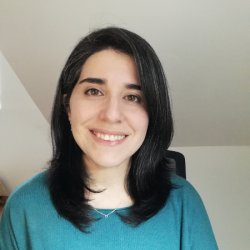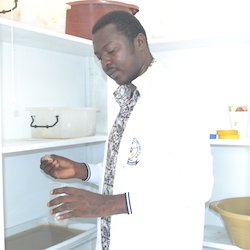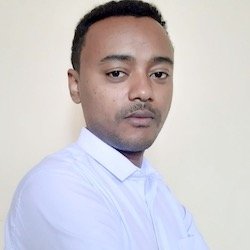
Meet our PhD Alumna Astrid Garrido from Chile

Before starting my PhD, I was working in the field of occupational safety and health in southern Chile. I was mainly dedicated to the surveillance of workers' health and prevention of occupational diseases in different industries. During that time, I also started my research on the work-related health problems of shellfish divers in small-scale fishing through the Master in International Occupational Safety and Health at CIHLMU. This allowed me to contribute to public initiatives aimed at preventing work-related health problems in professional diving in my region.
In my experience, the Ph.D. Medical Research - International Health is an excellent opportunity to concretize and consolidate ideas into a project. Through its implementation, not only research skills are strengthened, but also the contribution to society becomes visible. The support and guidance provided by my supervisors, as well as the learning and working experiences in an international context during the Module Blocks in Munich, are aspects that I consider very valuable in this program.
Working on my PhD project, I became aware of the need to consider the close relationships between community health problems (e.g., in small-scale artisanal fisheries) and factors beyond the health sector, such as the economy and the environment. Therefore, I am very pleased to be currently involved in One Health projects at CIHLMU .
Meet our PhD Alumnus Andreas Kudom from Ghana

My name is Andreas A. Kudom I come from Ghana and I’m currently a Senior Lecturer at the Department of Conservation Biology and Entomology, University of Cape Coast, Ghana.I did a PhD in International Health at CIH. Before starting my studies at CIH I was a principal research assistant at the University.
I chose this study program due to the sandwich module; do course work in Germany and work on my project of choice (thesis) in my country. The program has improved my research capacity as well as my organisational skills in planning scientific events. I really like the conscious effort of the program in improving our soft skills needed in academic life; especially the hands-on training in organising scientific seminars.
Currently I teach both undergraduate and postgraduate students on courses in the areas of medical entomology and insect toxicology. I also conduct research on vector bio-ecology and control with special focus on mosquito management. For the future I have the plan of establishing a center of excellence for research into vector biology and control in Africa.
Meet our PhD Alumnus Million Tesfaye

Prior to joining the Ph. D medical research at CIHLMU , I was working at the Jimma University (Ethiopia) in the department of anesthesia; teaching undergraduate students on topics related to clinical anesthesia, ethics, and clinical research methods. I received my BSc and MSc in anesthesia from Jimma University and Addis Abeba University respectively.
I would say that my impressions with the program is that it is one of the most well-designed and innovative curricula that I have come across as a student for three reasons:
1. Content-wise
It enables the learner (at least from my perspective), be an all-sided person by exposing the student to a wide array of perspectives from various disciplines like cultural competency, rhetoric skills, scientific coaching, learning sciences, communication strategy, policy, politics, natural disaster, infectious diseases, epidemiology, statistics, statistical programming, etc... I don’t think it is that common to find such a blend of the various subjects coming together to bring something unique. At least I did not experience that before.
2. Social learning environment
I think learning (for that matter curriculum) is affected by the nature of the interactions of the learner, not only with the material but also among the learners themselves. The recruitment of diverse students from various disciplines and cultures shaped further our experience during the medical research program. This was possible because most students were from various cultural backgrounds and also scientific disciplines as well. Such open-minded recruitment I think is very essential and it contributed to the success of the program. I even remember students who had environmental engineering and radiology as a background sitting next to me. I consider this a rare opportunity because most schools I know in various settings have tunnel vision of teaching and learning, and only those with “related fields” are allowed to join the program. The Ph.D. in medical research program was hence several steps ahead by breaking the status quo in this regard. I trust the program will further continue to surprise the international community in this manner.
3. The “modality” of delivering the courses
It was 100% student-centric. Most of our instructors were surprisingly following the good practice of effective teaching. No session was boring and irrelevant. They never acted, as if, we as a learner have no idea about the matter they are teaching and needed salvation. Contrary to this most faculties were astonishingly effective in facilitating our learning experience, by guiding us to unravel our true potential within us. I would say I have seen in my eyes at the LMU what Plato was lamenting about in his Rhetoric book VII; saying "Education is not what the professions of certain men assert it to be. They presumably assert that they put into the soul knowledge that isn't in it, as though they were putting sight into blind eyes …. rather, this art takes as given that sight is there, but not rightly turned nor looking at what it ought to look at, and accomplishes this object." (Rhetoric book VII 518 C-D). I would recommend it to anyone who would like to test true education.
Right after completing the program, I was involved with projects related to Community Health Workers and Chronic Pain. Now, I am the vice director for the Community-Based Education program of the university. I also chair the Institutional Review Board at the health institute. Besides teaching and research, I also participate in projects related to e-Health and One Health. I am the project Partner to NORAD NURTURE Project, where we are trying to establish new ICT and eHealth-related innovative curriculums at various higher institutions in Ethiopia. Similarly, I am the work package 2 leader for the BETTEReHEALTH Project funded by the EU horizon, where we are closely studying eHealth solutions and policies in low-middle-income countries.
My main objective is however to get involved in CIH-related projects. Together with my mentor Prof. Siebeck, we are trying to strengthen the research and education capacity of the CIH alumni in Ethiopia under the PaNiE project. I am also the OH-TARGET Jimma representative where we have been successful in diagnosing and overcoming One Health-related challenge of the Low middle-income countries. This year we have also celebrated the opening of the CIH office at JU. This is a very big step forward. It gives me great pleasure to be part of this milestone together with my Colleague Prof. Esayas Kebede. I feel optimistic that in the next few years, we will make the CIH-JU partnership more deep, strategic, and sustainable with innovation and ideas. I look forward to it very much.

